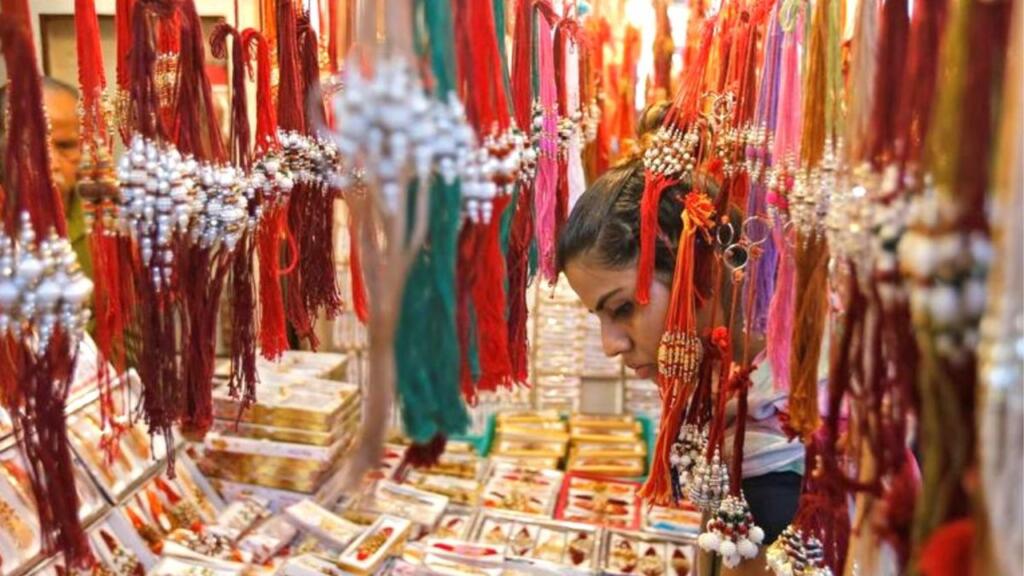In the aftermath of the Galwan clashes, a small and simple gesture has grown into a remarkable movement. What started as a response to the tensions has now evolved into a full-fledged phenomenon. The “Boycott China” movement has taken hold, and its impact is particularly evident during the festival of Rakshabandhan.
This movement’s effectiveness is underscored by its influence on Rakshabandhan, a cherished Indian festival. According to the Confederation of All India Traders (CAIT), the period from Raksha Bandhan to Diwali is projected to yield a staggering revenue of nearly Rs. 3 lakh crores for Indian dealers. This economic boost resonates with the movement’s goals of supporting local businesses.
Interestingly, this surge in indigenous commerce also translates into a substantial loss of around Rs. 1 lakh crore for China. This shift in consumer preferences reflects not only a growing sense of national pride but also a desire to promote self-reliance.
This year, there is a palpable preference among women for India-made rakhis over their Chinese counterparts. This choice reflects not only a sense of national pride but also a commitment to boosting the Indian economy by supporting local artisans and businesses. The enthusiasm to contribute to the domestic economy is shaping consumer choices and impacting the market dynamics surrounding Raksha Bandhan.
Notably, local traders are also aligning with this trend by refraining from buying or selling Chinese rakhis for the upcoming festival. Instead, they are channeling their efforts into promoting India-made rakhis, which not only reflects their solidarity but also holds the potential to generate employment opportunities within the local community.
Trade estimates reveal that a staggering 50 crore rakhis, symbolizing the sacred bond between brothers and sisters, are annually sold within the country during Raksha Bandhan. This immense market underscores the profound influence that consumer choices can have on shaping trade relations and market dynamics.
Also read: The legacy of WaghBakri Chai, and the story behind it
In addition to the conscious choices made by consumers and traders, the government’s efforts to bolster domestic manufacturing of handicrafts are also playing a significant role. Various festivals, including Janmashtami and Ganesh Chaturthi, are witnessing a revival of domestic production, thereby reducing dependency on imported goods.
The “Boycott China” movement, spearheaded by the Confederation of All India Traders (CAIT), has been instrumental in this shifting landscape. Since 2020, CAIT has been actively promoting the avoidance of Chinese products, aiming to safeguard Indian industries and businesses. The impact of this movement has been tangible, with reports indicating that China faced a loss of about Rs. 75 crores in holiday sales the previous year alone.
According to the leadership of CAIT, including BC Bhartia, the National President, and Praveen Khandelwal, the Secretary General, the momentum is growing strong. No orders for Diwali goods or firecrackers have been placed with China by Indian traders or importers, according to a recent survey by CAIT Research & Trade Development Society. This survey covered 20 cities across various states, underscoring the nationwide commitment to prioritize local products.
In line with this surge in support for indigenous goods, CAIT projected a substantial increase in sales for merchants and retailers before the Holi holiday, estimating nearly Rs. 25,000 crores in sales—an impressive 25% rise from the previous year. This shift is especially noteworthy considering that in the past, the import of Holi-related items, including colors, balloons, and toys, amounted to over Rs. 10,000 crores annually. The contrast is striking, with the current scenario highlighting the increasing prominence of locally-made products, with Delhi alone contributing about Rs. 1,500 crores in sales of non-Chinese goods.
The convergence of conscious consumer choices, trader solidarity, and focused governmental efforts is reshaping the commercial landscape, especially during festive seasons like Raksha Bandhan. The momentum generated by the “Boycott China” movement is not only impacting the economy but also fostering a sense of unity and resilience among Indian businesses and citizens.
Support TFI:
Support us to strengthen the ‘Right’ ideology of cultural nationalism by purchasing the best quality garments from TFI-STORE.COM
